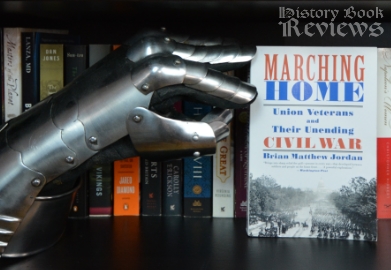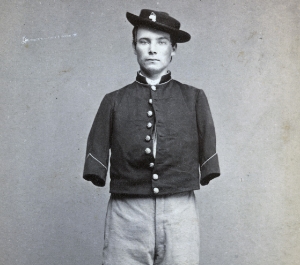Marching Home: Union Veterans and Their Unending Civil War
by Brian Matthew Jordan

Overview
- Author: Brian Matthew Jordan
- Published: 2016
- Topics: 19th Century, American Civil War, United States of America

Review
Lately I have been caught in the grip of another wave of Civil War obsession, and I desperately wanted to know about the adjustment of Civil War soldiers back to normal life after the war was over and their struggles with PTSD and reintegration into society. I thought this was too obscure a subject and was afraid at first I might have to research and write the book myself because it couldn't possibly exist already. But then I found Brian Matthew Jordan's Marching Home and I felt like I had found a needle in a haystack. If the needle was made out of diamonds.
Right off the bat, I have to say that Jordan is an incredible writer. Nearly every sentence was a masterpiece; clear, concise, intelligent, yet eloquent and inspiring in its simplicity. Normally when I take notes for my reviews, I write down a handful of quotes that perfectly encapsulate the content and emotion of the book, and parts that particularly stand out to me. My notes on Marching Home were over ten pages, front and back, because every other sentence in the book stood out to me as the perfect quote, heavily laden with impact. I actually stopped reading the book a dozen times because I was afraid to finish it. My only complaint about Marching Home is that it was far too short. I would have been thrilled to read 500 additional pages of Brian Matthew Jordan's writing on this topic, it was that magnificent.

Veterans like these, with an "empty sleeve" (or two), felt that their "disfigured bodies equipped them with cultural and political power." (107)
This book focuses on exactly that which I mentioned above, and it is tragic and beautiful. Interestingly though, it only covers the post-war experiences of Union soldiers. At first I wondered why Jordan needed to choose sides in his research, but his explanation of his choice was groundbreaking for me. I never knew that the Union and Confederate soldiers had such incredibly different post-war experiences. Although the South lost, the soldiers returned home as heroes to their people, praised and glorified for the rest of their lives for their support of the Lost Cause. Union soldiers, on the other hand, came home victorious but instantly became relics of a struggle that the rest of the North wanted to forget. Instantly after the war was over, politics demanded that the North and South reunite and that people forge peace and move ahead, making the Union veterans "impossible nuisances who, by obsessing over their past, merely threatened the future and all of its possibilities." (7) They were ignored, neglected by government and civilians, and seen as embarrassments. The many personal details demonstrating this in Marching Home are deeply upsetting and contrary to the image of post-war peace filled with happy reunions.
Nearly two million men (and an unknown quantity of women) fought for the Union, and around 75% of these were under the age of 30. Those that returned home alive exhibited a heartbreaking story of profound dislocation, of lives spent as discarded reminders of something no one wanted to remember. Civilians were neither willing nor able to understand the true nature of the war, and so quickly adopted a "sanitized and depoliticized narrative" (6), enshrining the Civil War in history as a glorious, honorable and brilliant drama, ignoring the hundreds of thousands of bloated bodies rotting in the sun and the mental horrors faced by survivors. Marching Home will not allow us to forget, and Jordan lets the reader hear from the survivors themselves in quotes from diaries, letters, and memoirs that blend so seamlessly I felt like I could hear the men speaking. Between prisoners of war, amputees, and veterans whole in body but with injured minds, this book paints a comprehensive picture of their difficulties reintegrating to society. Many felt that although they were back in their houses with their families, they were never able to truly return home after the war; staggering numbers subsequently faced alcoholism, destitution, and suicide.
Many of the veterans saw themselves as "living witnesses" and wardens of the war's history. They saved and collected artifacts from the war, even combing the battlefields they once fought in to find physical remnants of their experiences. They were haunted by their past and simultaneously completely unable to move beyond it. They needed desperately to talk about the war to anyone who could understand them, needed desperately to relive it, painful as it may have been. This makes me wish more than anything that I had lived back then. I desperately need to hear about their experiences, to understand the war and the people within it...I would have spent months or years with these veterans, examining every relic, reading every memoir, seeing every scar, writing down and memorializing everything they said about the war. The entire nation had abandoned them, but I would have cared enough for the whole world.
This book shows the utterly tragic side of these veterans, and it does not neglect to show their ugly side. Men who lived in soldier's homes in order to survive behaved like troubled teens---they wrote lewd notes in library books, heckled the authorities, and beat each other with their canes and crutches. One veteran met a woman outside and threatened to "kick the s*** out of her" for no reason, and hurled stones at passing civilians. In 1913, nearly 50 years after the war ended, Union and Confederate veterans met for a Jubilee Reunion. During the celebrations, two veterans (at least in their 70's) got into a fight about Abraham Lincoln that turned into a brawl, and seven men in total had to be rushed to a hospital. This would almost be funny if it wasn't so awful and sad. However uncomfortable it may be, Jordan confronts the difficult issues that no one wants to face: The neglect and ill treatment of these veterans after the war, the anger and betrayal they felt upon returning home, and the politically selective remembering of the war by civilians to whitewash it into something more comfortable. This is an incredibly powerful and important lesson to learn, both for history itself and for a better understanding of modern veterans.
It is an amazing thought that even as recently as the 1950's, there were still living veterans of the Civil War. As long as they breathed, the war was still part of living memory. At the death of Albert Woolson, the last surviving veteran, in 1956, an impenetrable barrier descended over our connection to the war. It is at once so close we can see the stubble on its soldiers in their crisp sepia photographs, and simultaneously so distant that we can hardly even see the figures through the haze. But Marching Home brings it back vividly and explores the long overlooked history of veterans after the war, burning them into the reader's memory and ensuring they will not be forgotten again. There really is no uplifting part to this book. But its significance and impact, and the stunning literary talent of Brian Matthew Jordan, make it one of the most wonderful and rewarding books I have ever read.


